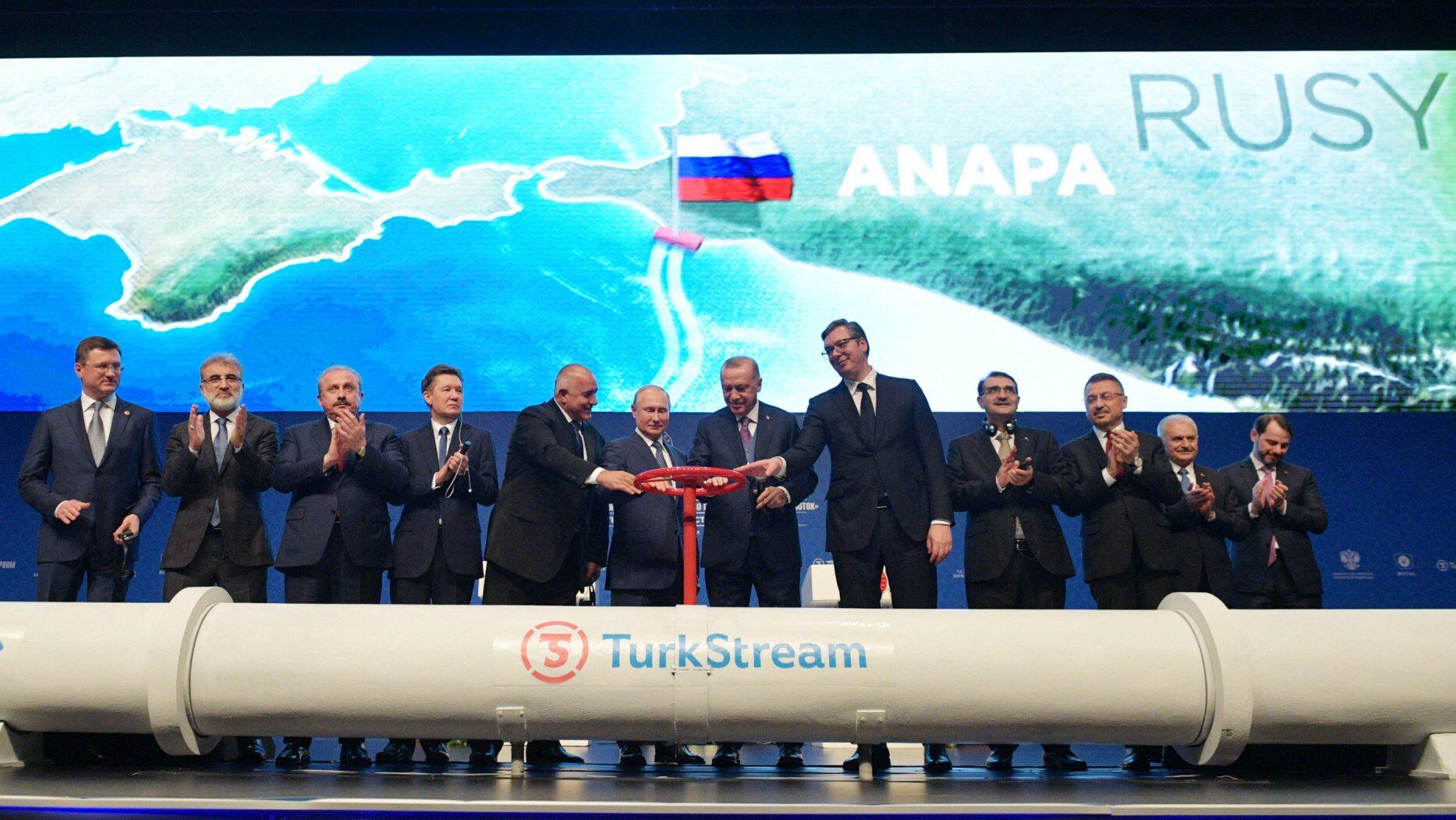
The inauguration of the TurkStream pipeline in 2020. In the center, from left to right: (former) Bulgarian PM Boyko Borisov, Russian President Vladimir Putin, Turkish President Recep Tayyip Erdoğan, and Serbian President Aleksandar Vučić.
Photo: Alexey Druzhinin / AFP
Russia has intercepted nine Ukrainian drones that were trying to attack part of the infrastructure of the TurkStream natural gas pipeline, the Russian defense ministry announced on Monday, January 13th.
Moscow said the drones were targeting a compressor station in the southern Russian region of Krasnodar. Although falling fragments from one of the downed drones had caused minor damage to a gas metering station, there were no casualties and the facility is working normally.
Russia believes the attack aimed to “cut off gas supplies to European countries,” and accused Ukraine of conducting “energy terrorism” against the EU.
In Krasnodar, Ukraine used drones to attack the Turkstream gas pipeline pumping station. According to Russia, pumping station is in operation. pic.twitter.com/ns7mMW5fRl
— Sander (@SanderRegter) January 13, 2025
Kyiv has so far refused to comment on the accusation, but if the incident did take place, it’s hard to imagine anyone else being behind it, given how desperate the Zelensky administration is to cut its allies in Europe off from Russian gas supplies.
TurkStream—running underneath the Black Sea toward Turkey, then through Bulgaria to Serbia, Hungary, Slovakia, and Austria—is the last operational gas pipeline connecting Russia to the EU.
Before the war, there were four pipeline networks through which most of Europe accessed cheap Russian gas. The Yamal gas pipeline (through Belarus and Poland toward Germany) was disconnected by Warsaw following the invasion of Ukraine in early 2022. The Nord Stream 1 and 2 in the Baltic Sea were sabotaged later that year, most likely by Ukrainian operatives. The Brotherhood pipeline, running through Ukraine, is still intact, but Kyiv refused to renew its expired transit agreement with Russian Gazprom after December 2024, which has led to an escalating diplomatic dispute with Slovakia.
Currently, TurkStream delivers gas to Turkey, Hungary, and Serbia. Bulgaria stopped importing Russian gas last year but continues to transit it under contracts signed before the war. This makes Hungary the most hard-hit EU member state in case of a successful sabotage attempt. But just like Slovakia, the country can hardly count on Brussels’ support despite its energy security being jeopardized.
“[The] TurkStream pipeline is essential for the supply of natural gas to Hungary and Central Europe,” Hungary’s foreign minister, Péter Szijjárt commented on Monday. “We expect the security and operability of this transport route to be respected by all.”
Energy security is a matter of sovereignty, so any action threatening the security of our energy supply must be regarded as an attack on sovereignty.
💬 "We expect everyone to respect the security and functionality of the TurkStream pipeline," stated Foreign Minister Péter Szijjártó on Facebook. He emphasized the critical role this route plays in Hungary and Central Europe's gas supply, adding that "it has operated reliably… pic.twitter.com/PdZXnWKtSj
— Zoltan Kovacs (@zoltanspox) January 13, 2025
This newest attack comes agaisnt the backdrop of escalating tensions between Kyiv and Bratislava, as Slovak PM Robert Fico has been threatening “reciprocal measures” (such as cutting Slovak electricity imports to Ukraine and withdrawing support for its EU accession) unless Kyiv resumes its previous gas deliveries or compensates Slovakia for hundreds of millions in lost revenues. Despite Fico warning Brussels that Ukraine’s decision will cost Europe up to €120 billion a year in higher energy prices, EU leaders offered little to no help in solving the issue.
On Monday, Fico sent a lengthy open letter to Zelensky in which he argued that halting gas deliveries was causing “enormous damage” to the entire EU and that Slovakia was “not alone holding this position in Europe.” The prime minister invited Zelensky to meet him as soon as possible on the two countries’ shared border to discuss the issue, to which the president only replied: “OK. Come to Kyiv on Friday.”
Ok. Come to Kyiv on Friday. pic.twitter.com/9lOSLCR7FD
— Volodymyr Zelenskyy / Володимир Зеленський (@ZelenskyyUa) January 13, 2025
